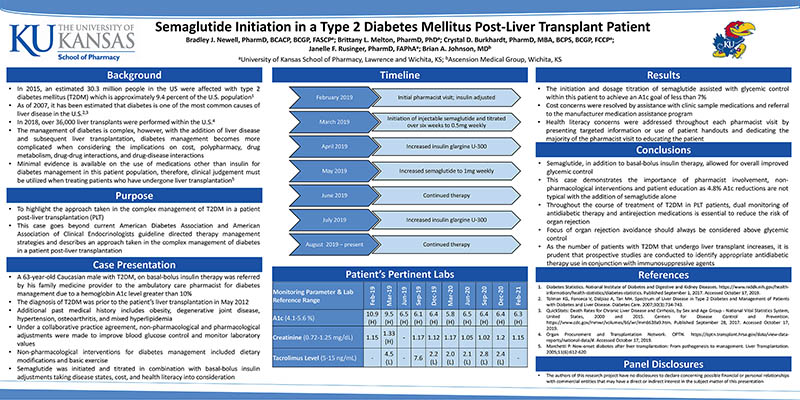
Hover to pan and click to magnify. Click again to pan at full screen.
Bradley J. Newell, PharmD, BCACP, BCGP, FASCP
Brittany L. Melton, PharmD, PhD
Crystal D. Burkhardt, PharmD, MBA, BCPS, BCGP, FCCP
Janelle F. Rusinger, PharmD, FAPhA
Brian A. Johnson, MD
Bradley J. Newell, PharmD, BCACP, BCGP, FASCP
Brittany L. Melton, PharmD, PhD
Crystal D. Burkhardt, PharmD, MBA, BCPS, BCGP, FCCP
Janelle F. Rusinger, PharmD, FAPhA
Brian A. Johnson, MD
University of Kansas School of Pharmacy, Lawrence and Wichita, KS
Ascension Medical Group, Wichita, KS
ABSTRACT
Introduction:
Going beyond current diabetes guidelines, this case report describes the initiation of semaglutide in the complex management of type 2 diabetes mellitus (T2DM) in a patient post-liver transplantation (PLT).
Case:
A 63-year-old Caucasian male with T2DM, on basal-bolus insulin therapy for management, was referred by his family medicine provider to the ambulatory care pharmacist for diabetes management due to a hemoglobin A1c level greater than 10%. Semaglutide was initiated and titrated to improve blood glucose control in combination with basal-bolus insulin adjustments taking disease states, cost, and health literacy into consideration. Over an eight-month period, the patient’s A1c level improved to achieve a goal of less than 7% while remaining stable on tacrolimus therapy. Combined non-pharmacological interventions and the role of the pharmacist are critical as a 3% A1c reduction with adding semaglutide is not usually seen.
Discussion:
Without precise T2DM guidelines in PLT patients, clinical judgement must be utilized while incorporating patient specific social determinants of health. PLT patients with diabetes can minimize drug side-effects, reduce risk of organ rejection, and achieve A1c goal through engagement of the pharmacist in care to address the needs of the whole patient through immunosuppressant therapy monitoring and diabetes medication adjustments. While the addition of semaglutide assisted in glycemic control, influencing factors must be considered.
Conclusion:
Semaglutide, in addition to basal-bolus insulin therapy, allowed for overall improved glycemic control, however further studies are needed to further evaluate efficacy due to the complexity of diabetes management in this patient population.

DISQUS COMMENTS WILL BE SHOWN ONLY WHEN YOUR SITE IS ONLINE